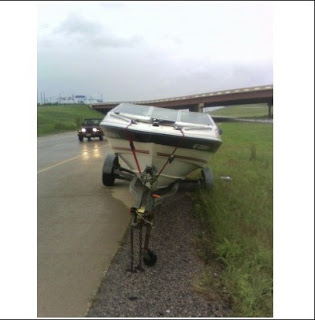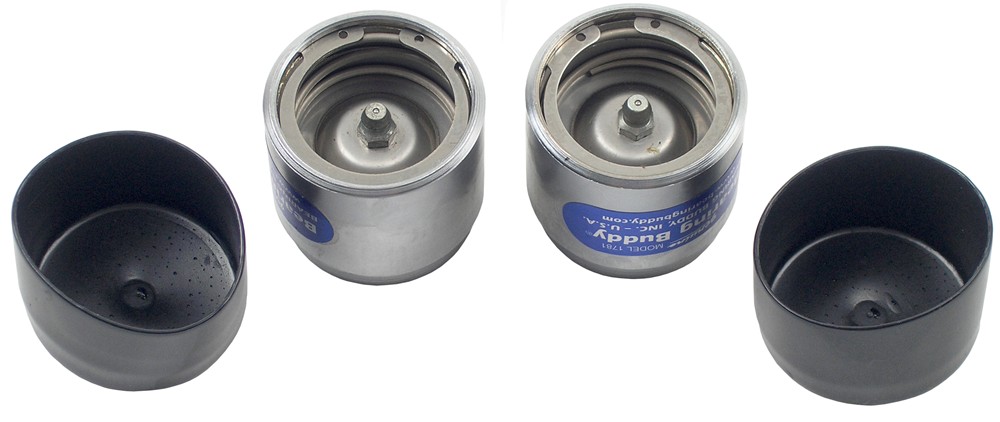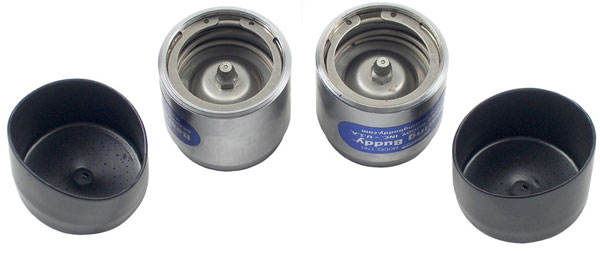Search
Latest Articles
Boat Trailer Maintenance
by Mike Carey, August 26, 2015
Our rear left trailer tire was indeed flat as a pancake. I proceeded to jack up the trailer and pulled my spare out of the truck bed. A half hour later (and about a pound of sweat in the ninety degree weather) we were back on the road to Redmond.
When you own a boat, there are so many things to manage, and we often pay more attention to our boats and motors than we do to one of the most important safety equipment that comes with the boat. I’m talking of course, about the trailer. That piece of galvanized metal with tires and lights. That piece of equipment can often become an afterthought when it comes to boat ownership. But we ignore our trailers at our own peril, and those around us. So let’s talk a little trailer safety and routine maintenance. Certainly as important as keeping your boat motor in good running condition.
Your boat trailer is made up of several key components, all of which need to be routinely inspected and taken care of. From tongue to taillights let’s look at them in order and talk about some of the things you need to watch for.
The trailer tongue is where your trailer makes its intimate contact with your towing vehicle. The marriage of truck and trailer is critical to your and other traveler’s safety. Check that the coupler latch moves the collar that locks under the hitch ball. When towing, you should have a paddle lock in place to keep the trailer secured, and it’s also important for security when you leave your rig in the parking lot.
Inspect the couple for wear, and add some grease if you note wearing. Hitch balls can wear through couplers. Be sure your safety chains are sound, and when attaching them you want to “criss-cross” the chains so that if your trailer does disconnect while driving the tongue will land on the chain and be supported. It won’t hold long, but even a few seconds can be a matter of life and death.
A word about the tongue jack – while not a safety item per say, it should be inspected as well for loose components or too much play. Having a jack collapse and trailer tongue land on your foot will send you to the ER very quickly.
The winch can be a knuckle buster or worse, deliver a K-O knockout punch to your face. Your winch should have a clicker lever that works like anti-reverse on a fishing reel. You can only crank in and the winch strap won’t release back allowing your boat to roll back into the water. Speaking of winch straps, check for frayed strap or line, especially where the strap/line attaches to the boat hook. Remember, when you’re winching your boat in ALL the weight of your boat is applied to that one connection. Once you have your boat winched in, allows use a safety chain. It’s a vital piece of safety equipment as well. And of course, two stern straps to secure the back of the boat to the trailer are a must.
Are you seeing a pattern here? All these parts of a trailer should be looked at as safety components, because that really is what they are.
Electrical connections between the trailer and the truck are the bane of every boat owner’s existence. I have never owned a trailer that hasn’t had light issues. With the advent of LED lights that require no light bulb changing trailer lights should be less of a headache. If you have the old bulb style lights you may want to consider upgrading to LED. All wiring connections should have water-proof shrink tape to minimize corrosion issues. Lights need to be in good working order for on the road safety.
Trailers have either bunks or rollers. Both should be inspected routinely for wear. Bunk carpets are often stapled to the wood bunk. Check that the staples are not working loose or rotting around the wood. Rollers can become rusted and stop rolling, which makes launching and retrieving more difficult. The time to check these areas is of course when the boat is in the water. It only takes a moment to inspect for problems.
Now we come to our tires, wheel bearings, and axle. One study I saw indicated these areas can lead to almost 80% of trailer problems. Yearly maintenance is critical here.
Let’s look at the tires. Unlike motor vehicle tires, your trailer tires are not rated for miles of longevity. They are a different animal entirely. They’re usually of a bias ply design, which provides higher load capacity and stiffer sidewalls compared to the more flexible radial tire design found on most trucks and cars. Because of that stiffness it’s harder to visual “guess” if a tire is under inflated. So periodically check air pressure and make sure you keep the tires fully inflated. Also, be prepared to buy new tires every 3-5 years, even if they look like they have plenty of tread. Think about it – trailer tires often sit for months on end in one position, which causes areas of weakness and breakdown. By the way, down forget to check the lug nuts from time to time.
Wheel bearings and axels should be maintained on a yearly basis. One item I consider essential is a bearing buddy. This piece of equipment keeps water out of the inner workings of the bearing. It also allows you to easily add grease to the bearing, which should be done periodically. Use a Number 2 grade lubricant to fill the hubs completely. It’s easy to see when to add grease with a bearing buddy. If the outer spring is compressed, they’re full. If the spring is extended, add grease till the spring compresses fully. Either you or your mechanic should clean and re-pack the bearings yearly.
Trailers like to rust. It’s what they do. Even galvanization is not full proof. Here in the Pacific Northwest, we have two sources of rust forming. One is launching in the saltwater. The second is traveling over passes that have been salted in the winter. In each case, when you clean your boat and flush your motor you also need to wash your trailer. Just spraying with water or backing the boat into a freshwater lake ramp is not enough. Saltwater and salt will get into ever crack and crevice of your trailer. The only way to really clean it is to use a soap water spray followed by a fresh water rinse. The soap is the key in removing the salt. It’s really not that hard to clean a boat and trailer all at once. I’ve gotten into the habit of going to a self-serve car wash. For $6 I can give my boat and trailer a complete wash job that takes less than ten minutes. That $6 and ten minutes will more than pay for itself in years of preventive medicine.
If you’re like me, you use your boat hard and get the most out of it. Proper care of your trailer will give you many years of trouble-free use. And keep you and others safe on the road.



